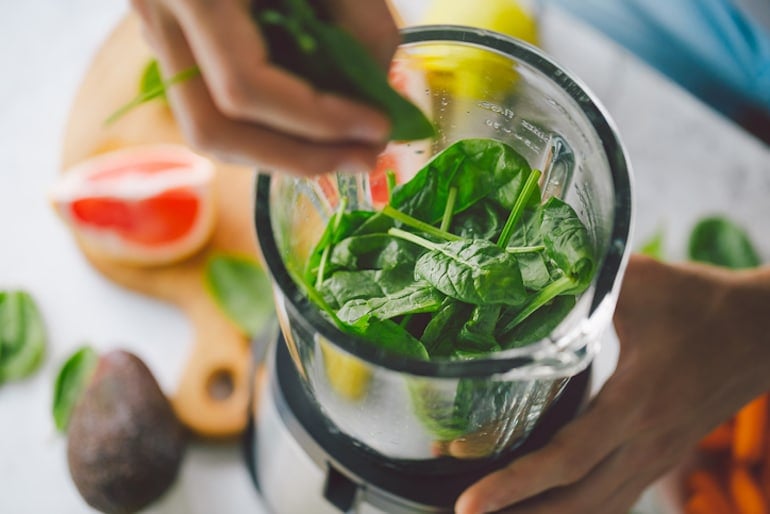An RD’s Guide to the Best Vitamins for Glowing Skin
Jessica Bippen, MS, RD, shares six of the best vitamins and minerals for radiant and glowing skin.
When it comes to healthy, glowing skin, topical treatments can only get you so far. After all, unlocking the full potential of your skin—and health!—depends upon what you put into your body.
Keep reading to learn about the benefits of vitamins for your skin, plus which nutrients can help you put your best face forward.
How Vitamins Can Benefit Your Skin
Focusing on specific nutrients your skin needs can help:
- clear up persistent breakouts
- lock in moisture to combat dry, dull skin
- increase elasticity and firmness
- minimize the appearance of fine lines and wrinkles
The foundation for healthy skin begins on a cellular level by nourishing your body with the proper nutrients. Simply incorporate nutrient-dense foods and/or supplements to combat your unique skin concerns and support an even, fresh skin tone.

The 6 Best Vitamins for Glowing Skin
If you’re depleted of vitamins like B, C, E, and omega-3s—plus minerals like zinc and selenium—your skin can lack clarity, radiance, and shine.
Here’s how and why they’re among the best vitamins for glowing skin and a clear complexion.
1. B vitamins
Several B vitamins play a role in skin health, especially with promoting healthy cell turnover and reducing breakouts. These water-soluble vitamins include:
- thiamine (B1)
- riboflavin (B2)
- niacin (B3)
- pantothenic acid (B5)
- pyridoxine (B6)
- biotin (B7)
- folate (B9, also known as folic acid)
- cobalamin (B12)
While all B vitamins play unique roles in the body, most of them contribute in some way to the production of skin cells.
For instance, B6 and biotin support healthy collagen production. Collagen helps maintain the skin’s elasticity and firmness, reducing the appearance of fine lines and wrinkles that come with our natural aging process. Further, vitamin B5 may help with breakouts and signs of aging.
B vitamins are water-soluble vitamins, meaning they dissolve in water. When the body has an excess of these vitamins, they’re excreted through urination. That’s why it’s especially important to regularly consume B vitamins from vitamin B-rich foods or supplements.
Foods that contain B vitamins include grains, legumes, nuts, eggs, meat. You can also find B vitamins in veggies such as carrots, spinach, and peas.
That being said, several lifestyle factors can contribute to an increased need for B vitamins. If you’re vegan, under constant stress, or consume alcohol regularly, you may consider taking Base Control, which contains all of the glow-getting B vitamins. Think of it as an insurance policy for your daily vitamins and minerals. Bonus: Your skin will thank you!
2. Vitamin C
Vitamin C works overtime as both a vitamin and antioxidant. This unique property allows vitamin C to do wonderful things not only for immune health, but also your skin.
First, vitamin C promotes collagen production. Yes, we talk about collagen a lot! That’s because collagen is the most abundant protein in the body, with the majority found in your skin. Collagen gives your skin the structure it needs beneath the surface. Further, maintaining collagen levels helps with skin firmness and elasticity.
Also, studies recommend increasing vitamin C intake for adequate protection against UV light. By acting as an antioxidant, vitamin C helps give your skin extra protection and strength from harmful UV rays.
The foods with the most concentrated sources of vitamin C include guava, alma fruit, red peppers, kiwis, strawberries, and oranges.
Additionally, you can boost your skincare routine with vitamin C supplements. Air Patrol and Glow Sweet Glow can help ensure you’re getting in your daily dose of vitamin C and alma fruit (which isn’t easy to find!).

3. Vitamin E
Vitamin E is one of the four fat-soluble vitamins. Like vitamin C, it also acts as an antioxidant in the body.
Vitamin E supports the skin’s aging process and a healthy, even skin tone. It can absorb the energy from UV light, which damages skin and leads to wrinkles, sagging, and photodamage.
Additionally, studies show vitamin E may help with skin hydration and faster scar healing. Finally, it also works together with vitamin C to strengthen the cell walls of skin cells.
To get more vitamin E in your diet, eat more sunflower seeds, pumpkin seeds, almonds, hazelnuts, spinach, avocado, Swiss chard, and mustard greens. You can also healthy dose of vitamin E with HUM’s Glow Sweet Glow and Red Carpet supplements.
4. Omega Fatty ACids
To achieve glowing skin, your skin needs omega-3 fatty acids.
These types of fats are responsible for the health of the cell membrane, which influences the cell’s ability to hold water for hydrated, soft skin. Omega-3s like EPA and DHA have been shown to create a more even tone and reduce the severity of acne.
They’ve also shown the potential to protect the skin from UV exposure. Harmful UV rays can lead to dryness, redness, wrinkles, and breakouts. For their ability to combat dryness, dullness, and inflammation, it’s no surprise that omega-3s are among the best nutrients for glowing skin.
Foods rich in omega-3 fatty acids include wild salmon, walnuts, flaxseed, chia seeds, and hemp seeds. However, it can be challenging to get enough omega-3s through diet alone. Supplementing with a high-quality omega-3 fish oil can be beneficial for both your skin and overall health.

5. Zinc
This mineral plays an important role in skin health by preventing cell damage and promoting wound healing.
Zinc can also help attract and remove blemish-causing toxins in the body. Its skin-clearing properties are why it’s included HUM’s Daily Cleanse, which helps banish breakouts from within.
Foods high in zinc include oysters, fish, almonds, pumpkin seeds, legumes, and whole grains. If you’re looking for extra support, HUM’s Base Control multivitamin and Daily Cleanse can help ensure you’re getting adequate levels of zinc in your diet.
Fun fact: While it’s important to make sure you get enough zinc daily, you can also use this mineral topically to protect against UV rays. In fact, it’s often the main ingredient in mineral sunscreens.
6. Selenium
Ths trace mineral often gets overlooked. However, it’s an important skin-supporting element. Selenium assists glutathione—the body’s main antioxidant—which helps protect the skin, especially from damage caused by UV rays. Selenium also helps maintain skin elasticity to prevent premature aging.
Good sources of selenium include Brazil nuts, seafood, eggs, whole grains, spinach, and cashews. You can also find selenium paired with zinc in Base Control and Daily Cleanse.
Final Thoughts
Your skin will benefit from adhering to a healthy diet, drinking plenty of water, and following a good skincare routine. However, you may still need extra support from specific minerals and vitamins to make your skin glow.
As a final reminder, the best vitamins and minerals for glowing skin include B vitamins, vitamin C, vitamin E, omega fatty acids, zinc, and selenium. By incorporating these nutrients into your diet through food and/or supplements, you’ll not only support your overall heath, but also get glowing in the right direction.
The post An RD’s Guide to the Best Vitamins for Glowing Skin appeared first on HUM Nutrition Blog.
Original source: https://www.humnutrition.com/blog/best-vitamins-for-glowing-skin/
Comments
Post a Comment